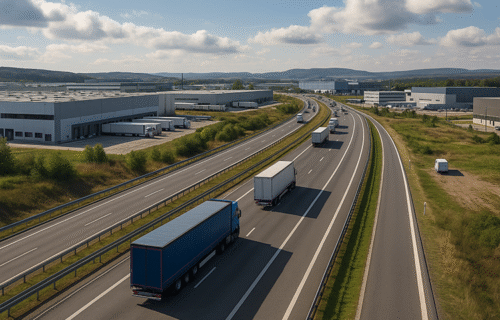The rapid expansion of the Czech Republic’s motorway network is reshaping the country’s industrial geography and solidifying its role as a key European logistics corridor. New sections of the D3, D52, and D0 motorways are cutting travel times between Prague, Brno, Vienna, and Linz, while simultaneously transforming cities such as Olomouc, Jihlava, and Liberec into new regional logistics and manufacturing hubs.
According to research by Colliers, more than 300 kilometres of new expressways are expected to be completed by the end of the decade, connecting the Czech Republic more directly to Germany, Austria, Poland, and Slovakia. This will reduce freight travel times between Prague and Vienna to roughly three hours and make Linz reachable in two and a half. The enhanced accessibility is attracting developers and manufacturers seeking affordable space and reliable transport links.
“What were once long-term plans are now tangible projects,” said Josefína Kurfürstová, senior consultant at Colliers. “The Czech Republic is evolving into a logistical bridge connecting Central European economies. Industrial developers are following the new corridors as the motorway network expands.”
Cities once considered peripheral are gaining momentum. Locations such as České Budějovice, Přerov, and Jihlava now record indicative industrial rents between €5.40 and €5.90 per square metre per month, compared with €7.00 to €7.50 in Prague. Analysts say this emerging regional diversification could relieve pressure on the capital’s crowded logistics market while generating new employment outside traditional hubs.
At present, nearly 1.7 million square metres of warehouse space is under construction across 171 logistics parks, with the Prague and Central Bohemian regions accounting for about 26 percent of total activity. Other strong regions include Moravia-Silesia with 19 percent and Karlovy Vary with 18 percent, the latter buoyed by the ongoing construction of a 200,000-square-metre automated logistics facility in Cheb.
The Czech government has acknowledged the country’s growing role as a strategic transit route and is pursuing measures to ensure the boom benefits domestic regions rather than turning the nation into a bypass for international freight. The Transport Policy to 2027, approved earlier this year, focuses on creating a high-quality, reliable, and sustainable transport network that links regional centres while aligning with the EU’s Trans-European Transport Network. The government is also reviewing freight toll regimes to discourage heavy transit traffic that provides limited economic benefit locally.
Officials say upcoming toll reforms will extend charges to additional motorway segments and are part of a broader effort to direct freight flows toward routes that support local development. The Ministry of Transport is simultaneously preparing measures to attract value-added logistics operations—such as warehouse processing, light manufacturing, and service hubs—to regional cities.
These policy adjustments reflect a growing awareness that logistics growth must generate local economic returns rather than simply facilitate cross-border transit. A ministry spokesperson noted that infrastructure investment cannot only make the country faster, but also stronger in terms of regional employment and competitiveness.
With connections improving in all directions, the Czech Republic is increasingly seen as the central junction of continental supply chains. The country now links northern ports in Poland and Germany with southern gateways in Austria and the Adriatic, enabling faster movement of goods between Europe’s industrial heartlands. As Kurfürstová observed, “Where highways end, new hubs begin. The Czech Republic’s logistics future is not just about transit—it’s about creating new economic centres connected by infrastructure built for the next generation of trade.”
